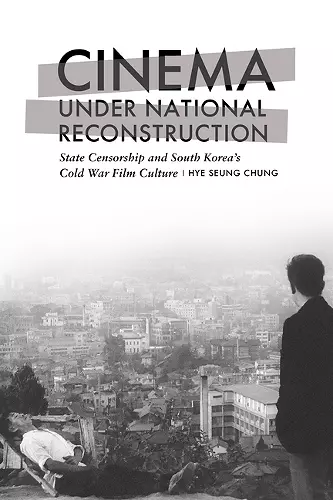Cinema Under National Reconstruction
State Censorship and South Korea's Cold War Film Culture
Format:Paperback
Publisher:Rutgers University Press
Published:15th Nov '24
Should be back in stock very soon

Cinema under National Reconstruction calls for a revisionist understanding of state film censorship during successive Cold War military regimes in South Korea (1961–1988). Drawing upon primary documents from the Korean Film Archive’s digitized database and framing South Korean film censorship from a transnational perspective, Hye Seung Chung makes the case that, while political oppression/repression existed inside and outside the film industry during this period, film censorship was not simply a tool for authoritarian dictatorship. Through such case studies as Yu Hyun-mok’s The Stray Bullet (1961), Ha Kil-jong’s The March of the Fools (1975), and Yi Chang-ho’s Declaration of Fools (1983), the author defines censorship as a dialogical process of cultural negotiations wherein the state, the film industry, and the public fight out a battle over the definitions and functions of national cinema. In the context of Cold War Korea, one cannot fully understand or construct film history without reassessing censorship as a productive feedback system where both state regulators and filmmakers played active roles in shaping the new narrative or sentiment of the nation on the big screen.
"Theoretically sophisticated and extensively researched, Hye Seung Chung’s Cinema under National Reconstruction reveals the ways in which multiple actors (the state, the film industry, the public) negotiate the definition of national cinema. A groundbreaking work that takes Korean film censorship studies to a new level." - Theodore H. Hughes (author of Literature and Film in Cold War South Korea: Freedom's Frontier) “Hye Seung Chung’s brilliant book deepens our understanding of cinema as a site of social and political contest. The product of impressive research in Korean and American archives, it offers a rare comparative perspective on censorship practices on both sides of the Pacific. Chung challenges conventional wisdom about the always-deleterious effects of censorship and profoundly revises our understanding of Korean filmmakers’ relationship to the state. Her analysis of government and industry records provides an important corrective to scholars’ reliance on the words and perspectives directors, who were often sidelined during the censorship process. A major contribution to postwar Korean film history.”
- Christina Klein (author of Cold War Cosmopolitanism: Period Style in 1950s Korean Cinema) "Hye Seung Chung's provocative study sheds new light on the ways state censorship functioned-and malfunctioned-in Korea during the Cold War. She challenges the usual narrative-in which an oppressive, all-powerful censorship regime strangled artistic creativity in the Korean motion picture industry-and argues instead for a more nuanced understanding both of the apparatus of state censorship and the ways Korean filmmakers operated within and around it."
- Thomas Doherty (author of Little Lindy Is Kidnapped: How the Media Covered the Crime of the Century)
ISBN: 9781978838710
Dimensions: 235mm x 156mm x 18mm
Weight: 367g
252 pages